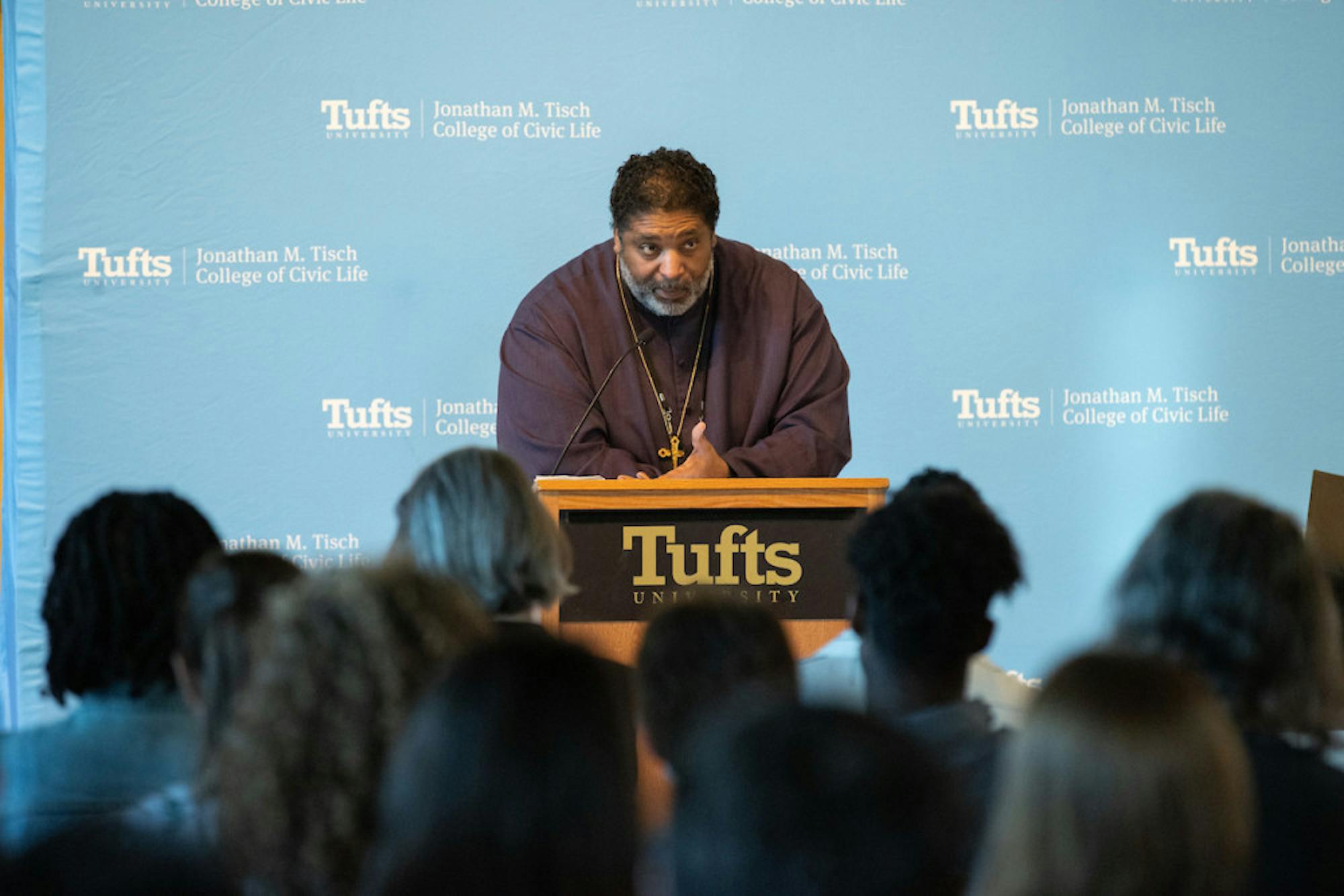On April 13, renowned orator and civil rights activist Bishop William J. Barber II spoke on his work with the Poor People’s Campaign and how he believes the moral crisis he sees in America can be addressed.
The event was part of the Solomont Speaker Series hosted by the Jonathan M. Tisch College of Civic Life and was co-hosted by the University Chaplaincy and the Africana Center. Other sponsors included the Political Science Department, Tufts Democrats and the Civic Studies Program.
The event began with an introduction by Dayna Cunningham, dean of the Tisch College of Civic Life, who said that Dr. Cornel West once described Barber as “the closest person we have to Martin Luther King Jr. in our midst.” Cunningham introduced Barber’s work, including his role as the co-chair of the Poor People’s Campaign.
The campaign is modeled after the 1968 campaign of the same name, organized by the Southern Christian Leadership Conference under the leadership of MLK Jr. The campaign calls for a “moral revival” to “transform the political, economic and moral structures of our society.”
“[Barber] said Moral Mondays was a call for moral revival from the underside of history to build a broad fusion movement to serve the nation’s 140 million poor people,” Cunningham said. “There was a message of love and compassion and justice for all.”
Barber began his speech by offering students three ways to respond to crises: “You can start crying, you can start cursing or you just start marching.”
Barber said that as a campaign and not an organization, the Poor People’s Campaign has an action network for those who want to show up in front of legislatures, in the streets and for voter registration efforts.
“[The campaign] started with 17 people going into the state legislature to challenge … an aggressive group of extremists who had won because of racialized gerrymandering,” Barber said.
“We started with the moral framework of the constitution and our sacred scripture.”
His political statements led to run-ins with the law. As Barber put it, “I got arrested for praying too loud.”
Barber said the campaign used both a voter registration strategy and a legal strategy.
“We knew that if we registered 10% of the unregistered voters, they could fundamentally shift the electorate in North Carolina,” Barber said, referring to his voter registration strategy. With regards to the legal element, Barber said, “Everything we marched about on the street, we took under the microscope of the Constitution. And we sued them.”
Now, Barber says, people are going back to the streets because of the backlash against some of their victories. Barber called for a “moral Third Reconstruction” in response to the “moral crisis” he says the country is facing.
“What [King] was calling for, in ’67 I believe, that we need today, is a moral pentecost,” Barber said.
Barber harkened back to the First Reconstruction, following the Civil War, referencing the placement of Black and white coalitions in Southern legislatures and the rewriting of constitutions to include progressive language. However, events such as the Compromise of 1877, the Wilmington riots and the Plessy v. Ferguson decision ended the era of racial progress.
“Reconstruction … didn’t just stop,” Barber said. “It was murdered.”
Barber described the Second Reconstruction, beginning in the 1950s, as legal achievements secured thanks to activists spanning race, gender and background. “I keep mentioning this because we need to know the whole history,” he added.
Barber’s discussion of history led him to contemporary issues, including voter suppression.
Barber criticized the Shelby County v. Holder decision of 2013, because, he said, it allowed North Carolina senators to pass “the worst voter suppression laws we have seen since Jim Crow.”
“It might be targeted at Black people, but ultimately voter suppression nullifies the democracy itself and has a negative impact on all people,” he said. “They are after suppressing the vote … to keep out people, progressive, either Black or white or brown, so that they can control who sets policy.”
Barber also called political moderates “the worst enemy to progress.” This belief, Barber said, was also shared by MLK Jr., who said the greatest enemy to the civil rights movement would be liberal moderates “who love order more than they love justice.”
According to Barber, in America, there are 37 million people who are uninsured and 55 million people who make less than a living wage. During COVID, he said, poor people died at a rate three to five times higher than anyone else because so many of them lacked healthcare and were forced to work on the front lines.
“We created more billionaires during COVID than ever before, while the poor die,” Barber said.
Barber argued that legislation could be passed to alleviate these issues if progress was not halted by the wishes of the elite and by division in Congress.
“All this division was planned toward the end of the Second Reconstruction,” Barber said, but he believes “if it could be planned, it could be unplanned [and] if it can be done, it can be undone.”
Barber closed his remarks by referencing the recent expulsion of two Black legislators from the Tennessee House of Representatives for protesting against gun violence in the House chamber. One of these representatives, Justin Jones, was trained in the Poor People’s campaign, and, along with others, has been calling for a Third Reconstruction in response to the incident.
“It is a mighty moral wind that is blowing,” Barber said of these developments. He ended the event with a call to action for people who have been rejected in their lives.
“How many of you know what it’s like to be rejected because of your race, or rejected because of your income, or rejected because of who you love?” Barber said. “The key to the transformation of the country is for all the rejected to come together.”






